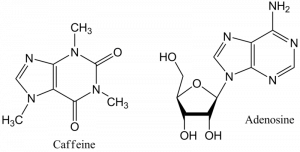Many people enjoy having a cup of coffee in the morning for its mood-enhancing and stimulatory effects. According to Methods Data from the National Health and Nutrition Examination Survey (NHANES), most caffeine (70%) is consumed before noon and it’s commonly believed that caffeine makes up for lost sleep. However, the belief is slightly different from how it actually works.
How Caffeine Is Introduced To the Body:
When you drink a coffee, caffeine is first absorbed in the small intestine within an hour and becomes available through the blood and most parts of the body, including your brain. Then, as it starts entering your brain, it starts competing with a compound called adenosine.
What Is Adenosine?
Adenosine is a very well-known sleep-regulating molecule that makes you get sleepy as the day comes to an end, and it is constantly monitored by the nervous system through receptors. So, when its levels drop and reach a certain low-level in your spinal cord and brain, your body signals you to start relaxing to prepare for sleep.
How Does It Work?
The way that caffeine works is by tricking your body to think that it’s not the time for sleep yet by acting like adenosine. Normally, once adenosine interacts with the adenosine receptor, the interaction results in muscle relaxation and sleepiness. However, when caffeine is in your brain, caffeine competes with adenosine and prevents adenosine from binding to adenosine receptors, which is what gives you the sense of wakefulness you get from drinking coffee.
How Long Do the Effects Last?
Although the effects vary from person to person, caffeine generally gives you more energy and lasts for about 5-6 hours. After that, caffeine molecules start to move away from the receptors and change into various substances (such as paraxanthine and theobromine) through different enzymes. Then, as a result, significantly fewer caffeine molecules end up occupying the adenosine receptors, allowing adenosine to start interacting with adenosine receptors again and promote muscle relaxation and sleepiness. This process is what makes you feel sleepy again.
In conclusion, even though caffeine does not make up lost sleep, it is true that it gives you more energy. When it is consumed, it works toward your body’s adenosine receptors and mirrors the effects.
-Janet Lee


